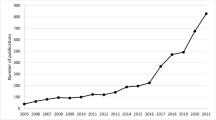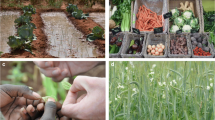
Overview
- This Open Access volume describes both theoretical and practical aspects of agroecological transition specifics
- This Open Access work broadens readers understanding of original conceptual and methodological framework for supporting local stakeholders into the agroecological transition design process
- This Open Access book explains how to structure an original teamwork to handle agroecological transition specifics
- These contributions offer a step-by-step procedures methods and tools design
- This Open Access book provides case studies that illustrate methods and tools application and results assessment
Buy print copy
Tax calculation will be finalised at checkout
About this book
This Open Access book presents feedback from the ‘Territorial Agroecological Transition in Action’- TATA-BOX research project, which was devoted to these specific issues. The multidisciplinary and multi-organisation research team steered a four-year action-research process in two territories of France. It also presents:
i) the key dimensions to be considered when dealing with agroecological transition: diversity of agriculture models, management of uncertainties, polycentric governance, autonomies, and role of actors’ networks;
ii) an operational and original participatory process and associated boundary tools to support local stakeholders in shifting from a shared diagnosis to a shared action plan for transition, and in so doing developing mutual understanding and involvement;
iii) an analysis of the main effects of the methodology on research organisation and on stakeholders’ development and application;
iv) critical analysis and foresights on the main outcomes of TATA-BOX, provided by external researchers.
Similar content being viewed by others
Keywords
Table of contents (15 chapters)
-
Front Matter
-
Introduction
-
Front Matter
-
-
Territorial Agroecological Transition at a Concept Crossroads
-
Front Matter
-
-
Support Methodology for Territorial Agroecological Transition Design, and Feedback from the TATA-BOX Project Experience
-
Front Matter
-
-
New Prospects and Cross-Cutting Perspectives
-
Front Matter
-
Editors and Affiliations
About the editors
Jacques-Eric Bergez, is a PhD senior scientist, accredited to supervise research at INRA (French National Institute for Agricultural Research), unit AGIR (AGroecologies, Innovations & teRritories). His main interests are in systemic agronomy and modelling. His main research topic is the description and modelling of farmers’ practices in order to develop innovative crop management systems. He is the leader of the INRA AGIR research unit (90 persons). He is the scientific leader of the RECORD users’ network, RECORD being a modelling and simulation platform to develop and work with agroecosystem models. He coordinates (2014-2017) a research project on developing a methodology to help stakeholders to modify their agricultural practices in order to reach a more agroecological agriculture. He participated at the development and evaluation of a modelling framework to evaluate the contribution of innovative cropping systems to the overall sustainability (2005-2012). He is the (co)author of more than sixty research papers and managed eight theses.
Elise Audouin is an agroecologist within INRA (French National Institute for Agricultural Research), unit AGIR (AGroecologies, Innovations & teRritories). Her main expertise is on development and facilitation of participatory process for supporting stakeholders in designing agroecological transition. She specialized on the conception of participatory methods, representation modes, intermediary objects design and scientific mediation. She develop and facilitated 24 workshop so far with 412 participants in contrasted contexts (Europe, Central America and the Carribbean, Scandinavian countries; Africa); and on contrasted topics (specific agroecological farm pratices; organic consumption; chain impacts; holistic agroecological project) and scales (from farm to city, department to production chain).
Olivier Therond is a landscape agronomist within INRA, (French National Institute for Agricultural Research), unit LAE (Laboratory Agronomy and Environment). His main expertise is on methods for integrated assessment and modeling of social-ecological systems. Recent activities focus on analysis and assessment of agriculture models, development of the MAELIA multi-agent modeling and simulation platform, development of participatory methods and boundary objects (including models) for supporting stakeholders in designing agricultural landscapes to deal with water shortage issues, crop–livestock systems, and agroecological transitions at the local level. He is the (co)author of more than forty research papers and managed five theses.
Bibliographic Information
Book Title: Agroecological Transitions: From Theory to Practice in Local Participatory Design
Editors: Jacques-Eric Bergez, Elise Audouin, Olivier Therond
DOI: https://doi.org/10.1007/978-3-030-01953-2
Publisher: Springer Cham
eBook Packages: Biomedical and Life Sciences, Biomedical and Life Sciences (R0)
Copyright Information: The Editor(s) (if applicable) and The Author(s) 2019
Hardcover ISBN: 978-3-030-01952-5Published: 10 April 2019
eBook ISBN: 978-3-030-01953-2Published: 28 February 2019
Edition Number: 1
Number of Pages: XVI, 335
Number of Illustrations: 15 b/w illustrations, 44 illustrations in colour
Topics: Agriculture, Sustainable Development, Soil Science & Conservation, Environmental and Sustainability Education, Environmental Law/Policy/Ecojustice



